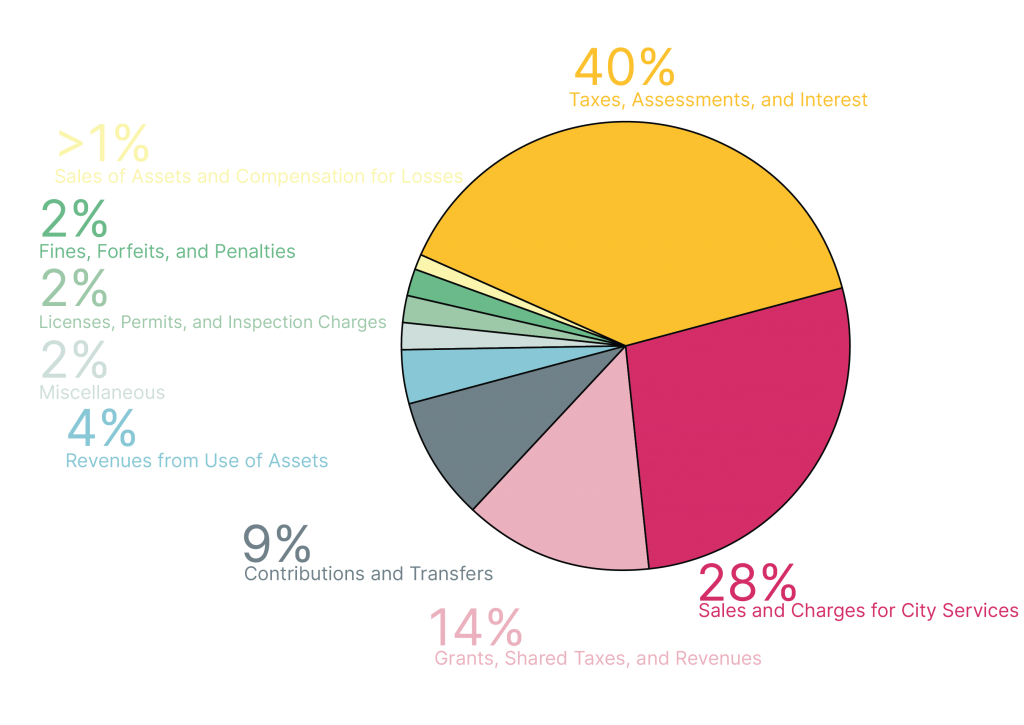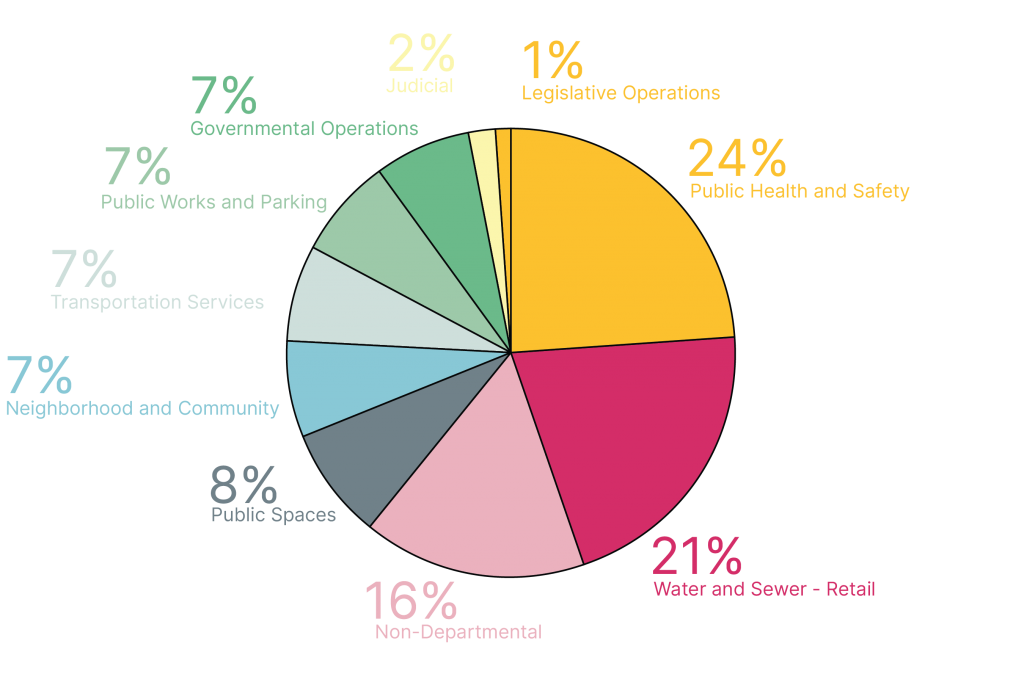Why Does This Matter?
We know that the primary purpose of local government is to serve its citizens. The City of Detroit serves its citizens in a variety of ways, but these services all require funding. Local government needs money to pay for things such as utilities, public safety, and infrastructure (the structures that allow our city to function such as water processing facilities, bridges, and even internet access).
But what does this have to do with being an engaged citizen of Detroit? We’ve talked about being an engaged citizen and what it means to shape, lead, and give back to our community. In this lesson, we explore how the City of Detroit collects and spends money to serve its citizens. The City’s budget process provides plenty of opportunities for us as citizens to shape and give back to Detroit. This information will help us think about how our priorities align with the priorities of the City and its officials. Understanding our City’s finances enables us to use local government to accomplish goals in our communities. Furthermore, it allows us to hold elected officials accountable when government fails to do its job.
Connecting the Dots


Have you ever been shopping and found the perfect outfit, but you could only afford one or two pieces? You would buy the whole outfit if you could, but your budget says otherwise. You only have a certain amount of money to spend, so you must decide the best way to spend it.
Maybe you buy the shirt now, but wait until you save enough money for the pants. More than likely, your decision will be based on your priorities, which are guided by what you need and what you want –– what is essential and what is not.
The same is true for governments. As citizens, we depend on local government for many services. We expect our lives and property to be protected. We want our communities to be clean and sanitary. We expect our utilities to work and our public transportation to be efficient. While the charter outlines services the City is responsible for providing, it all comes down to what it can afford and what it legally is obligated to provide.
Every year, the City of Detroit must decide what services to provide based on the total revenue (money generated) and resources available. They prioritize the needs of the city and make decisions based on that. Priorities are set during the budget process. They are informed by many factors, including citizens, community input, the city charter, state government, and federal government. The more revenue the City has, the more services it can provide. If revenues decrease, the City must make tough decisions on which services to cut back.
As citizens, it’s essential to know what services the City can provide and how those decisions are made. It’s all a part of what it means to be an engaged citizen. Doing so helps us understand what can and can’t be funded; what trade-offs were considered; and grants us the ability to better prepare ourselves and our communities in times of need.
The charter mandates Budget and Finance Departments and that work falls to the Office of the Chief Financial Officer to oversee.
| Office of the Chief Financial Officer (OCFO) | Managing the City’s finances. The OCFO creates the City budget; collects revenue such aslike property and income taxes; provides property assessments; provides financial reporting of the City’s activities; provides financial services, planning, and analysis; and manages grants. |
To gain a better understanding of how the City of Detroit collects and spends money, we need to know its sources of revenue. We can start by creating two categories of revenue –– tax revenue and non-tax revenue.
Tax Revenue


While governments collect money from many places, a big portion of their revenue comes from taxes. A tax is a sum of money collected by the government from its citizens. The federal, state, and local levels all have the power to tax its citizens. The taxes we pay allow the City of Detroit to operate and pay for the services that our communities depend on.
There are a few different types of taxes that help to pay for the services we receive.
Local taxes: Local governments have the right to tax its citizens. The kinds of taxes a city can levy, or collect, are determined by the state government. Local tax revenues for the City of Detroit include:
| Local Taxes | Description |
|---|---|
| Income Tax | Citizens who work and earn money in Detroit are required to give a portion of their paycheck to local government, regardless of whether they live in the city. Revenue from these taxes can be used for any local government activity. |
| Property Tax | Citizens who own property in Detroit are required to pay taxes on it, whether it’s a vacant lot, a house, or the Renaissance Center. The amount that is collected is based on the value of the property. Revenue from these taxes may be used to support services such as police, fire, utilities, recreation, and various other departmental activities within Detroit city government. |
| Utility Users’ Tax | Citizens who use utilities in Detroit like electricity, gas, steam, and telephone services are required to pay a tax. Revenue from these taxes has a specific purpose. They must be used to pay for police officers or to improve the streetlightingsystem. |
| Casino Wagering Tax | Detroit’s three casinos are required to pay taxes to the City. Revenue from this tax can be used for any local government activity. |
State-shared taxes: Michigan’s Constitution requires the state to share a portion of its tax revenue with Detroit and other local governments. This is referred to as revenue sharing. Shared tax revenue comes from two sources: the sales tax and the gas and weight tax.
| State-Shared Taxes | Description |
|---|---|
| Sales Tax | Citizens pay a tax to the State for almost everything they buy at a store, excluding certain items such asfresh produce. The State is responsible for collecting the sales tax, and sharing a portion of it with the city. Revenue from these taxes can be used for any local government activity. |
| Gas and Weight Tax | Citizens who own cars pay vehicle registration fees and taxes on gasoline and diesel fuel. The Detroit Department of Public Works uses revenue shared from these taxes for street maintenance. |
Do you think about sales tax?


I get frustrated when I plan to grab snacks from the store and forget to plan for sales tax–my money just doesn’t go as far as I thought it would. I’m learning to become more intentional about planning and saving my money. What about you?. When saving up for a video game, a new pair of shoes, other items, do you think about the sales tax?
Non-Tax Revenue
While a large portion of the City’s revenue comes from taxes, the City of Detroit collects money through other avenues which include:
| Revenue Sources | Description/Examples |
|---|---|
| Sales and Charges for City Services | Fees charged by the City for its services. Examples include: bus fares, solid waste fees, and other reimbursements. |
| Grants | A sum of money from the state or federal government given for a particular purpose. Examples include: Head Start Grant, which funds early education for children under five years old. The Community Development Block Grant (CDBG), which is awarded to cities to funds large categories of neighborhood and community development programming and can therefore be used broadly. Sometimes local organizations can apply for these grants directly from the state or federal governments. Or, once the funds have been given to the city, they can apply to the city for funds to support services (this is the case with CDBG funds). |
| Licenses, Permits, and Inspection Charges | Fees charged by the City for licenses, permits, and inspections, which may be required for businesses. Examples include: safety inspection fees, business license fees, permit charges, construction inspection fees, etc. |
| Fines, Forfeits, and Penalties | Money and/or property that the city collects related to parking violations, traffic violations, ordinance fines, etc. An example of a forfeit is when your car gets towed as a penalty for a parking violation. |
| Sale of Assets | Sales of City property or equipment. |
| Use of Assets | Charges for the use of a City-owned facility or equipment. Examples include: parking facility costs, golf course concessions, airport hangar rental fees, etc. |
| Borrowed Money | Funds received through the sale of bonds. Selling a bond is like getting a loan; it is debt that the City takes on to pay for major projects,such as improving the city’s streetlighting system or rehabbing recreation centers. Repaying that debt usually takes years, and it can be deducted from future revenue. |
Where does the city’s money come from?


How does the City of Detroit spend money?
The City of Detroit spends money based on the budget that is adopted, or approved, by the City Council. On one hand a budget is a plan you follow, like when you find that perfect outfit in the mall. But a budget is also a plan you create ahead of time. When you have a home or an apartment, you know ahead of time that you’ll have to pay certain expenses such as rent and the light bill. You also know how much money you will have to spend and how much you will have left over for other things you may want like going roller skating, or eating out with friends. The mayor develops a budget like this for the city–one that outlines what money the city expects to be able to spend (revenue), what bills the city expects to pay, and any other expenses the Mayor thinks the city should support.
The budget is a plan for managing and spending the City’s money, and it shows both expected revenue and expenses based on a fiscal year. It represents the City’s spending priorities. How the City spends money is decided during the local budget process. The budget process determines how City services are paid for and what each department receives. It is a process that happens every year and involves the input of citizens.
Detroit’s budget process is outlined in our city charter. It requires the executive and legislative branches of city government to work together and develop a spending plan that represents residents’ interests. The City establishes deadlines ahead of time to guide the budget process and the Mayor and City Council must come to an agreement about the city’s budget.
The Budget Approval Process
- Departments publish general summaries of city spending
- Departments hold public meetings for citizen input
- The Mayor proposes a budget to City Council
- City Council conducts a public hearing for citizen input
- City Council then decides to reject or adopt the proposed budget
- If rejected the Mayor proposes a new budget to City Council
The budget process allows Detroiters to engage with local government and voice the priorities in our communities. City services that our communities rely on are directly impacted by this process. Citizen participation is a big part of the City’s decision-making process. Prior to the mayor’s budget proposal, local government reaches out to citizens to gain our input. Before November 1st of every year, departments in the executive branch conduct public meetings in our neighborhoods. The purpose of these meetings is to review programs, services, and activities to be included in the budget. Departments publish general summaries in one or more city newspapers outlining how money was spent in the prior year. At this time, citizens (meaning any resident of Detroit) can provide public comment and communicate spending priorities for the next year. Before City Council adopts the budget, a public hearing is held for citizens to voice our concerns or approval.
The Mayor also submits a separate spending plan, called a Capital Agenda, every other year which outlines planned spending on permanent projects and infrastructure. City Council also approves this plan. Unlike the budget, they can only approve or delete projects from the Agenda, and like the budget they provide an opportunity for the public to give comment on the Agenda.
We have opportunities every year to influence how our City spends its money. It is our right and responsibility to be involved in the budgeting process –– to advocate for the needs of all Detroiters.
Where does the city’s money go?


Lesson Review
Go through the City Budget Exercise (best as a group but can be done alone). Reflect on what you learned from the activity and answer the following questions:
- How do you prioritize department needs?
- Did you have enough money? If not, what was that like?
- How should city council and the mayor work together on City finances?
- What does understanding the budget process have to do with being an engaged citizen in Detroit?
